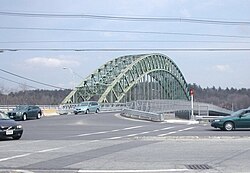The Tyngsborough Bridge is a steel tied-arch bridge located in Tyngsborough, Massachusetts and carries Route 113 over the Merrimack River. With a span of 547 feet, it has the longest span of any steel rib through arch bridges in Massachusetts. It is also the 2nd oldest steel rib through arch bridge in the state. The bridge is center hinged and features pratt-type trussing.[3][4]
Tyngsborough Bridge | |
|---|---|
 The arch bridge in Tyngsborough, Massachusetts, with the Temporary bridge alongside it in 2006 | |
| Coordinates | 42°40′34″N 71°25′17″W / 42.67605°N 71.42133°W |
| Crosses | Merrimack River |
| Locale | Tyngsborough, Massachusetts |
| Official name | Tyngsborough Bridge |
| Owner | Massachusetts Highway Department |
| Preceded by | Whipple Truss Bridge |
| Characteristics | |
| Design | Tied-arch bridge |
| Material | Steel |
| Total length | 656 feet (200 m) |
| Width | 41.5 feet (12.6 m) |
| Longest span | 547 feet (167 m) |
| No. of spans | 1 |
| Piers in water | 0 |
| Load limit | M 18 |
| History | |
| Designer | MassHighway in-house Design Unit |
| Constructed by | Simpson Bros. Corporation[1] Boston Bridge Works[2] |
| Opened | 1930 |
| Rebuilt | 1975 |
| Statistics | |
| Daily traffic | 22,300 (2007) |
| Location | |
 | |
History
editThe Tyngsborough Bridge was constructed in 1931 to replace the wooden Whipple truss bridge. The new bridge was sited alongside but not parallel to the older, starting close the old structure on the eastern side of the river but reaching the western side well both of the old bridge.[5] The Tyngsboro Bridge shares its open, braced rib design with the Boston University Bridge.[6]
Starting in 1975 the bridge was rebuilt, but the cost of the construction generated controversy.[7]
In November 2005, the bridge was closed again for repairs following reports of structural deficiency. The temporary Mabey Panel Bridge was constructed alongside of the main bridge and repairs on the main bridge began in 2009. The repair operation was contracted out to S & R Corp. for $16.4 million, but eventually cost $19 million by the completion of the project. This was partially due to delays with steel girders failing stress tests, which required re-engineering, and the discovery that the original bridge had been constructed with lead paint which required S & R Corp. to take measures to ensure that the paint chips did not fall into the river below. The repairs took three years to complete with the bridge reopening in 2012.[8][9]
References
edit- ^ Building and Engineering Trades Reference Book of Massachusetts and Rhode Island. Boston: F.W. Dodge. 1904. pp. 270–1. Retrieved 29 August 2017. Advertisement appears between pages 270 and 271.
- ^ Galer, Gregory Jay (1989). The Boston Bridge Works and the Evolution of Truss Building Technology. Brown University Press.
- ^ "Massachusetts Cultural Resource Information System". Massachusetts Department of Transport Highway Division. Retrieved 22 June 2015.
- ^ "National Bridges Entry". National Bridges. National Bridges. Retrieved 22 June 2015.
- ^ Morton, Herbert (1996-05-01). Tyngsborough. pp. 21–4. ISBN 9780738589640. Retrieved August 27, 2017.
- ^ "About the Tyngsborough Bridge". Borough of Tyngsborough.
{{cite web}}: Missing or empty|url=(help) - ^ "Tyngsboro Voters Face One of the Largest Ballots in Recent History Tomorrow". The Lowell Sun. May 10, 1976. p. 36. Retrieved June 22, 2015 – via Newspapers.com.
- ^ Collins, John (July 7, 2009). "Tyngsboro Bridge is under repair". The Lowell Sun. Retrieved 26 June 2015.
- ^ Favot, Sarah (September 11, 2012). "547 feet never meant so much". The Lowell Sun. Retrieved 26 June 2015.
- Additional sources
- Peter M. Millot, The Lower Merrimack River Valley: an inventory of historic engineering and industrial sites (North Andover, Massachusetts: Merrimack Valley Textile Museum, 1978)